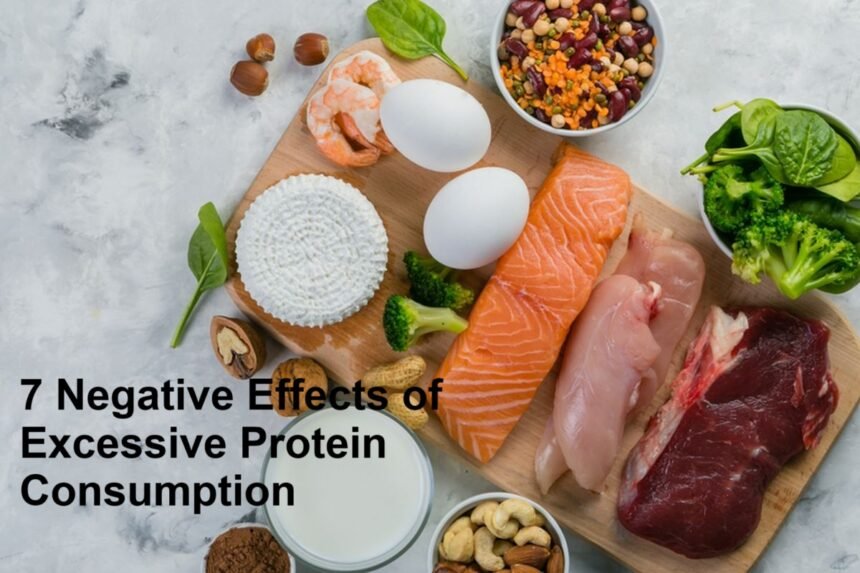Protein is an essential nutrient vital for building and repairing tissues, supporting immune function, and maintaining muscle mass. It’s a fundamental part of a balanced diet, especially for athletes, active individuals, and those aiming to improve overall health. However, like any nutrient, consuming protein excessively can have adverse effects on your health. Overconsumption of protein, particularly from sources like supplements, red meats, or processed foods, can lead to various health problems. Here are seven negative effects of eating too much protein.
1. Kidney Damage and Strain
One of the most discussed risks associated with high protein intake is its impact on kidney health. Excessive protein consumption increases the workload on the kidneys, which are responsible for filtering waste products from protein metabolism. For healthy individuals, moderate increases are usually safe, but those with pre-existing kidney disease or compromised renal function are at higher risk of accelerating kidney damage.
Studies suggest that high protein diets can lead to increased glomerular pressure and hyperfiltration, potentially causing long-term kidney damage if maintained over years.
2. Dehydration
High protein intake can also cause dehydration. As the body metabolizes protein, it produces nitrogenous waste products like urea, which must be flushed out via urine. This process increases urine production, leading to fluid loss. If you don’t increase your water intake accordingly, it can result in dehydration, which causes symptoms like dry mouth, fatigue, dizziness, and impaired cognitive function.
Proper hydration is crucial when consuming high-protein diets to prevent dehydration-related complications.
3. Digestive Issues
Consuming excessive protein can disturb the balance of your digestive system. For many, high protein intake—especially from animal sources—can cause constipation due to low fiber content. Conversely, it may lead to bloating, indigestion, or gastrointestinal discomfort in some individuals.
Overconsumption of protein-rich processed foods and supplements might also upset gut microbiota, leading to poor digestion and nutrient absorption issues over time.
4. Increased Risk of Heart Disease
High intake of certain protein sources, such as red and processed meats, has been linked to an increased risk of heart disease. These meats are often rich in saturated fats, cholesterol, and preservatives like nitrates, which can contribute to plaque buildup in arteries.
Additionally, diets high in animal proteins may lack protective plant-based foods like fruits, vegetables, and whole grains, which are known to support heart health. Switching to plant-based protein sources like legumes, nuts, and seeds can mitigate this risk.
5. Bone Health Concerns
Although protein is essential for bone strength, excessive consumption might paradoxically weaken bones over time. High protein diets, particularly from animal sources, can increase calcium excretion through urine. This calcium loss, if not balanced with adequate dietary calcium, could contribute to decreased bone density and higher fracture risk.
Maintaining a balanced intake of nutrients, including calcium and vitamin D, alongside moderate protein consumption, is vital for bone health.
6. Weight Gain and Obesity
Protein-rich diets are often associated with weight loss and muscle gain. However, excess calories from protein (or over-reliance on high-protein processed foods) can lead to weight gain. Many high-protein snacks and supplements contain added fats and sugars, increasing overall calorie intake.
Consuming more calories than your body needs, regardless of nutrient type, results in fat accumulation. It’s important to balance protein intake within your overall caloric needs to avoid unwanted weight gain.
7. Nutritional Imbalance
Focusing excessively on protein can lead to an unbalanced diet, neglecting other vital nutrients like carbohydrates, healthy fats, vitamins, and minerals. This imbalance can impair overall health, diminish energy levels, and weaken immune function.
A diet overly rich in protein might also limit the consumption of fruits, vegetables, and whole grains, depriving the body of fiber and phytochemicals necessary for optimal health.
Final Thoughts
While protein is undoubtedly vital for maintaining good health, moderation is key. Excessive protein intake can have a range of negative effects, from kidney strain to increased disease risk. To harness the benefits of protein without the adverse effects, aim for a balanced diet that includes a variety of nutrients and sources of protein.
Consult with a healthcare professional or a registered dietitian to determine the appropriate amount of protein tailored to your age, activity level, and health status. Remember, more isn’t always better—balance is essential for long-term health and well-being.












